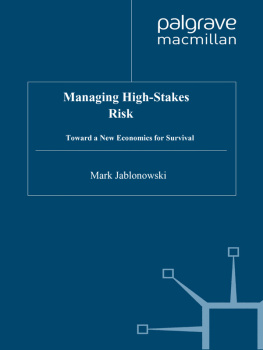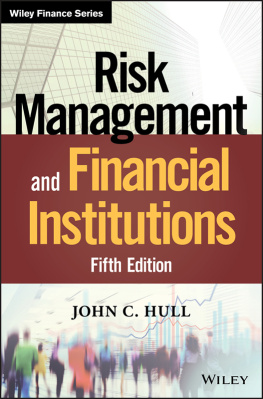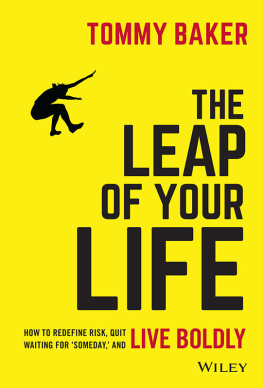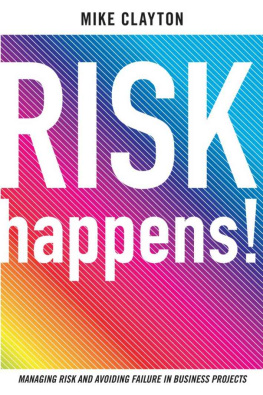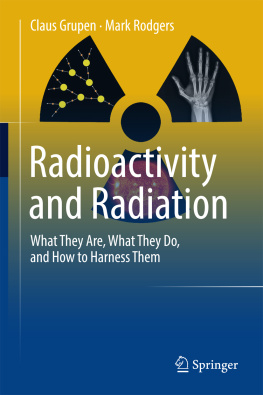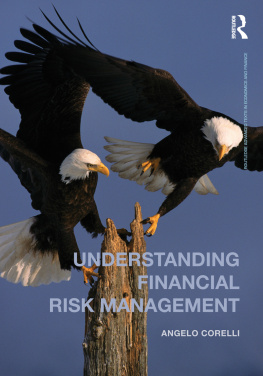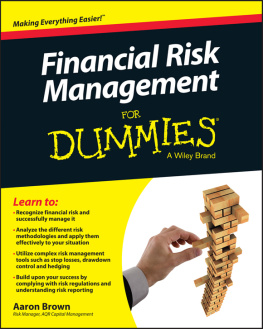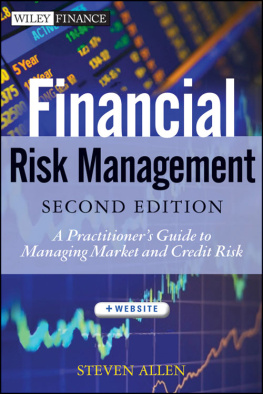Managing High-Stakes Risk
Also by Mark Jablonowski
PRECAUTIONARY RISK MANAGEMENT: Dealing with Catastrophic Loss
Potentials in Business, the Community and Society
RISK DILEMMAS: Forced Choices and Survival
Managing High-Stakes Risk
Toward a New Economics for Survival
Mark Jablonowski


Mark Jablonowski 2009
All rights reserved. No reproduction, copy or transmission of this
publication may be made without written permission.
No portion of this publication may be reproduced, copied or transmitted
save with written permission or in accordance with the provisions of the
Copyright, Designs and Patents Act 1988, or under the terms of any licence
permitting limited copying issued by the Copyright Licensing Agency,
Saffron House, 6-10 Kirby Street, London EC1N 8TS.
Any person who does any unauthorized act in relation to this publication
may be liable to criminal prosecution and civil claims for damages.
The author has asserted his right to be identified
as the author of this work in accordance with the Copyright,
Designs and Patents Act 1988.
First published 2009 by
PALGRAVE MACMILLAN
Palgrave Macmillan in the UK is an imprint of Macmillan Publishers Limited,
registered in England, company number 785998, of Houndmills, Basingstoke,
Hampshire RG21 6XS.
Palgrave Macmillan in the US is a division of St Martins Press LLC,
175 Fifth Avenue, New York, NY 10010.
Palgrave Macmillan is the global academic imprint of the above companies
and has companies and representatives throughout the world.
Palgrave and Macmillan are registered trademarks in the United States,
the United Kingdom, Europe and other countries.
ISBN-13: 9780230238275 hardback
This book is printed on paper suitable for recycling and made from fully
managed and sustained forest sources. Logging, pulping and manufacturing
processes are expected to conform to the environmental regulations of the
country of origin.
A catalogue record for this book is available from the British Library.
A catalog record for this book is available from the Library of Congress.
10 9 8 7 6 5 4 3 2 1
18 17 16 15 14 13 12 11 10 09
Printed and bound in Great Britain by
CPI Antony Rowe, Chippenham and Eastbourne
Preface: Does Our Existence Matter?
Intuitively, survival sounds like a very sound goal. At least we might all agree on the fact that survival is better than extinction. Some may suggest that the continuing human presence on earth provides at least some indication that our existence does matter to us. Yet, what about the future? While it may seem like survival is important to us, it is also becoming increasingly evident that, with respect to incurring existential threats, people accept the idea that there is no choice far too easily. The paradox that results is that we can achieve utopia, including the ultimate fruits of progress, only under the threat of extinction.
We might also agree that a completely risk-free life is simply not consistent with the way the physical world is. Practically, zero risk is unachievable, by the very laws of nature. Yet, a reasonable goal for a safer world might include achieving and maintaining risk at a natural risk level, assuring some minimum level of comfort. Such natural risk levels are, after all, consistent with a rather remarkable streak of human evolution. Nonetheless, we are by most indications very far from such natural levels today.
What about the technicalities of achieving a safer world? We might also quite reasonably believe that by setting appropriate risk goals, we could adequately plan for the achievement of such goals. Integrating survival planning into a system of social and economic planning seems like a perfect fit. A carefully planned course of action can help preserve survival against the increased complexities of progress. Yet recognizing the value of planning is not enough. We need the impetus to do it.
Clearly, achieving a safer world requires understanding the whys as well as the hows of survival. And that suggests that a deeper look into the philosophy of our existence is in order. Against the backdrop of moral commitments, to ourselves, other humans, and the natural environment that supports us, we can start to discern what actions really make sense when it comes to survival. Once we understand what it is we truly value, or should value, the impediments to achieving these ends become more apparent. These impediments may be practical, in the sense of doing what it takes to plan for more natural risk levels, or they may lie deeper within the human psyche. We therefore need to also understand what factors within ourselves may hinder the achievement of what we really value.
In the end, our actions will speak louder than words. The question of whether our existence matters will be answered by what we do. If we notice an inconsistency which we just cant live with, literally or figuratively, we need to take actions for change. We would suggest that these actions are, quite simply, based on coordinated planning for the achievement of natural risk levels. We would further argue that these actions are the only ones consistent with a philosophy of life that coordinates our existence with some sort of natural order, or what we ultimately call fate. On the other hand, we may choose to live with distortions of this philosophy, either foisted on us by others or which may perhaps be an unchangeable part of the human condition. We may even be fooled into considering current happiness as a suitable tradeoff for future existence. Doing so, we must at least recognize that such bargains may ultimately end our existence, or at least eventually make it a very unpleasant one.
In the discussion that follows, we present a realistic approach to the understanding of high-stakes risks, and their treatment. This presentation does not rely on scientific proofs, mathematical constructs, or carefully constructed experiments. In this sense, it is meant to be intuitive, in that it is based on extended experience. Risk is a physical property of the world. How we perceive and respond to such physical properties is what life is all about. This also means that it is up to all of us to have at least some understanding of the issues when it comes to the risks of our existence. In this world of specialization we have a tendency to leave even the most important things to others. We depend on others, either by commercial or social contract, to provide the guidance needed, when needed. With respect to risk, that means that we often feel that someone else is looking after us another individual, a business, or the government. That may or may not be the case. To become too dependent on others for our existence in our current laissez faire world is a dangerous gambit. At the very least, it assumes everyone else cares, or can be made to care, about our existence as much as we do. We have to figure out if existence matters for ourselves. Once we do, we cannot simply rely on all others to be of like mind. That said, we cant do it all by ourselves. In this world, some dependence on others is unavoidable. The unifying thread then is what we call here a sense of purpose. That means trying to understand where we fit into the wider scope of life. Once we recognize that sense of purpose, or are made to do so, we can then collectively work to achieve it.
This work offers, unapologetically, a possible framework for achieving some degree of concrete utopia. By that we mean an existence where our belonging makes sense, and in the process of this recognition we achieve maximum satisfaction. It is a rational view of what living the best life really means. The idea being that if we understand it all, even if that understanding entails identifying areas where that understanding is imperfect (i.e., knowing what we dont know), it brings with it a sense of peace. We at least achieve enough comfort to face whatever it is that this life has in store for us. In this sense, the idea of fate remains absolutely crucial to our existence. What will be, will be. The link between fate and utopia is being able to face what will be with the comfort that we did everything rationally possible to achieve a respectable life, regardless of how it turns out. Living a life within this natural order becomes its own reward its own utopia.

